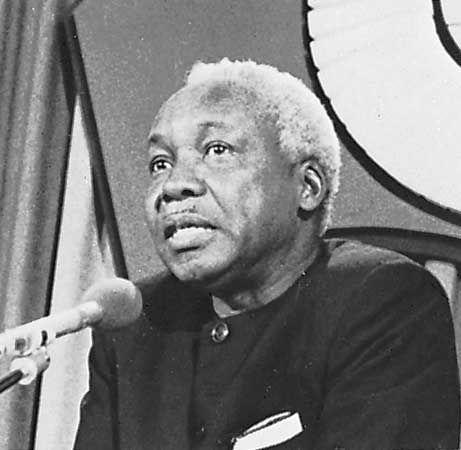Julius Nyerere: The Visionary Leader Who Shaped Modern Tanzania
In the annals of African history, few figures stand as prominently as Julius Nyerere, the founding father of Tanzania and a steadfast champion of socialism and Pan-Africanism. As the nation’s first president from 1964 until his retirement in 1985, Nyerere played a pivotal role in navigating the complexities of post-colonial governance, striving to forge a unified national identity amid diverse ethnic groups. His policies, often rooted in the ideology of Ujamaa—meaning “familyhood” in Swahili—sought to cultivate social and economic equality, but also faced criticism for their challenges and shortcomings. Today, as we examine Nyerere’s enduring legacy, we reflect on his contributions to not only Tanzanian society but also his influence on the broader African political landscape. This article delves into the life and accomplishments of Julius Nyerere, as detailed in the latest Britannica survey, highlighting his indelible mark on Tanzania and the continent at large.
Julius Nyerere’s Vision for Tanzania: A Legacy of Ujamaa and Socialism
Julius Nyerere’s vision for Tanzania was deeply rooted in the principles of Ujamaa, a Swahili term meaning “familyhood.” This philosophy emphasized communal living and collective responsibility, aiming to transform Tanzanian society into one where the welfare of the individual is interlinked with that of the community. Nyerere believed that true development could only be achieved through unity, cooperation, and social equity. To advance this vision, he implemented a variety of policies focused on agriculture, education, and health, striving to uplift the rural population and reduce economic disparities.
Under Nyerere’s leadership, the Tanzanian government embarked on the Socialist Experiment, nationalizing banks, industries, and agricultural production systems. His aim was to eradicate colonial legacies and empower the people through self-reliance and domestic control of resources. Despite facing challenges such as economic instability and resistance to certain reforms, Nyerere’s ideological commitment to socialism and Ujamaa left a lasting impact. The following table summarizes some key aspects of Nyerere’s approach:
| Aspect | Description |
|---|---|
| Philosophy | Ujamaa – emphasis on familyhood and community solidarity |
| Economic Policy | Nationalization of key industries and promoting self-reliance |
| Social Development | Focus on rural development, education, and healthcare |
| Legacy | Enduring influence on socialist movements in Africa |
Navigating Challenges: Nyerere’s Policies and Their Impact on Modern Governance
The legacy of Julius Nyerere, Tanzania’s first president, continues to resonate through modern governance in East Africa. His policies, particularly Ujamaa (familyhood), were designed to instill a sense of national unity and social equality, promoting a collective approach to development. This vision emphasized agricultural cooperation and the establishment of communal villages, which aimed at reducing colonial disparities and fostering self-reliance among citizens. However, the challenges of implementing these ideals often resulted in economic difficulties, which modern leaders still grapple with as they attempt to balance tradition and modernization in their governance practices.
Today, Nyerere’s focus on education and healthcare remains a guiding principle for various governments striving to improve the quality of life for their citizens. His belief in grassroots involvement has influenced contemporary democratic processes, encouraging civic participation and accountability among leaders. Modern Tanzania, while distinct in its challenges, still reflects elements of Nyerere’s vision through policies that promote sustainable development and collective welfare. Notably, the evolving political landscape has seen a shift towards more inclusive governance, yet echoes of Nyerere’s ideology persist as stakeholders navigate the complexities of regional integration and globalization.
Lessons from Nyerere’s Leadership: Recommendations for Contemporary African Leaders
Julius Nyerere’s tenure as Tanzania’s first president offers a blueprint for contemporary African leaders navigating the complexities of governance in the 21st century. Integrity and servant leadership were hallmarks of Nyerere’s approach; he prioritized the welfare of his people over personal gain, establishing a trust-rich environment. Modern leaders can embody these values by fostering transparency in government operations and prioritizing accountability. By embracing a humble stance and engaging communities in decision-making, leaders can effectively bridge the gap between government and citizens, enhancing social cohesion.
Furthermore, Nyerere’s emphasis on education as a tool for empowerment remains profoundly relevant today. Investing in education not only cultivates a skilled workforce but also nurtures informed citizens capable of contributing to national discourse. Contemporary leaders should focus on scalable educational reforms that promote inclusivity and accessibility. Initiatives designed to support vocational training and digital literacy will be pivotal in addressing the evolving needs of African economies.
| Key Lessons | Implications for Modern Governance |
|---|---|
| Integrity | Builds citizen trust and encourages participation |
| Servant Leadership | Puts people’s needs first, fostering loyalty |
| Education Investment | Empowers citizens, driving sustainable growth |
In Retrospect
In conclusion, Julius Nyerere remains a seminal figure in the history of Tanzania and the broader narrative of African independence. His commitment to socialism and self-reliance, compelling vision for nation-building, and emphasis on education have left an indelible mark on Tanzanian society and beyond. As the world continues to grapple with the socio-economic challenges that Nyerere sought to address, his legacy serves as a reminder of the enduring struggle for equity and justice. In reflecting on his contributions, we gain not only insight into Tanzania’s past but also inspiration for shaping a more equitable future.







